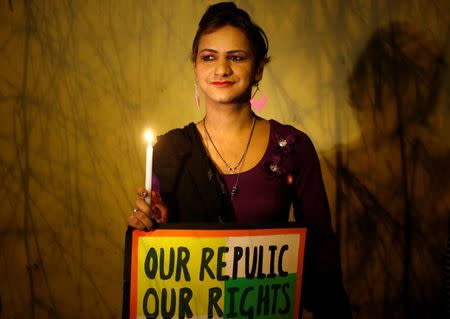Activists cautious over new government's stance on gay sex ban

By Nita Bhalla NEW DELHI, May 19 - Human rights groups on Monday expressed caution over whether India's newly elected right-wing government would reverse a ban on gay sex, saying they hoped marginalised communities in the the socially conservative nation would be respected. The Supreme Court in December outraged activists when it reinstated a law against gay sex, following a four-year period of decriminalisation which had helped bring homosexuality into the open in India. While the previous Congress-led government had pledged to repeal the law known as "Section 377" if it came to power again, it was crushed by Narendra Modi's Hindu nationalist Bharatiya Janata Party (BJP) in Friday's election. The BJP was silent on the issue of homosexuality during the election campaign, which was largely fought on economic issues and fighting corruption. "The BJP does not appear to have officially taken a stand on Section 377 or the broader issue of LGBT rights," said Shashikumar Velath of Amnesty International India. "While the party president has said ... that the party supports Section 377, other senior members ... have indicated that there has not been a discussion on the issue within the party, and also said that some voices within the BJP support the decriminalisation of homosexuality." In 2009, the Delhi High Court ruled the law - which dates back to 1860 and prohibits "carnal intercourse against the order of nature with any man, woman or animal" - as unconstitutional and lifted the ban for consenting adults. The Supreme Court however threw out the decision last year, saying only parliament could repeal it. Violation of the law can be punished with up to 10 years in jail. NO CLEAR STAND Some activists expressed little faith in the BJP and its allies to revoke Section 377, despite having an overwhelming majority in the lower house of parliament. They say the election of the BJP, which is perceived to be more conservative on issues related to women's and LGBT rights, could be a setback for the millions of gay, lesbian and transgender people in India. Following the Supreme Court decision in December, BJP chief Rajnath Singh told journalists: "Gay sex is not natural and we cannot support something which is unnatural." The party has also aligned itself with Baba Ramdev, a Hindu yoga guru who has a following of millions. Ramdev has publically been very critical of homosexuality claiming it is a disease that can be cured through yoga. But this stand has been questioned by Arun Jaitley, another senior BJP leader, who said the party had no official policy but that he personally believed that gay sex should be decriminalised. Human rights activists say they have now filed a curative petition, challenging the Supreme Court decision, which is due to be heard in July. "We are very cautious about relying on politicians to do anything for gay rights in this country," said Anjali Gopalan, head of the Naz Foundation, a Delhi-based NGO which is part of a consortium of advocacy groups fighting the court's decision. "We are hoping that we can resolve this through legal recourse, rather than through parliament. But if the court throws out our appeal, we will have no choice but to pin our hopes on the new government." Last month, the Supreme Court recognised the country's transgender community as a third gender in a landmark judgment, and called on the government to ensure their equal treatment.

